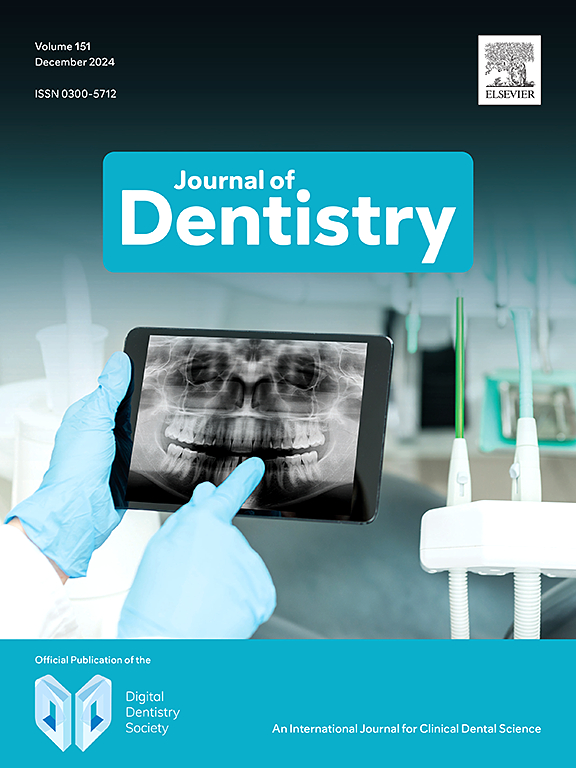社会因素、群集行为与口腔健康对日常表现影响的关系。
IF 4.8
2区 医学
Q1 DENTISTRY, ORAL SURGERY & MEDICINE
引用次数: 0
摘要
目的:研究目的是检验社会支持与网络、社会经济因素、行为集群和口腔对英国老年人日常表现的影响之间的关系。方法:数据摘自英国老龄化纵向研究。第3阶段的社会经济因素,第5阶段的社会支持(积极的和消极的)和网络,以及行为(吸烟、饮酒、水果和蔬菜消费、体育活动)。第7波的口服对日常表现的影响OIDP是结局变量。人口统计数据和基线时的OIDP被纳入分析。潜类分析(LCA)使用四个二分类行为变量来识别行为簇。建立了逻辑回归模型来评估这些关联。该模型根据人口因素进行了调整。结果:共纳入受试者2049人。LCA确定了两个集群:1类健康集群和2类风险集群。在完全调整的模型中,高水平的负面社会支持的参与者比低水平的负面社会支持的参与者有1.04 (95%CI: 1.01, 1.08)高的几率对他们的日常表现产生任何口头影响。与健康组相比,处于危险组的人在日常表现上受到任何口腔影响的几率高1.49 (95%CI: 1.01, 2.19)。结论:消极的社会支持和与健康相关的群集行为与英语成年人口腔对日常表现的影响有关。本文章由计算机程序翻译,如有差异,请以英文原文为准。
Association between social factors, cluster of behaviours and oral impact on daily performance
Objectives
The study objective was to examine the association between social support and network, socioeconomic factors, cluster of behaviours, and oral impact on daily performance of English older adults.
Methods
Data was extracted from the English Longitudinal Study of Ageing ELSA. Socioeconomic factors at Wave 3, social support (positive and negative) and network, and behaviours (smoking, alcohol intake, fruit and vegetable consumption, physical activity) at Wave 5 were included. Oral Impact on Daily Performance OIDP at Wave 7 was the outcome variable. Demographics and OIDP at baseline were included in the analysis. Latent class analysis (LCA) was conducted using four dichotomised behavioural variables to identify clusters of behaviours. Logistic regression modelling was created to assess the associations. The model was adjusted for demographic factors.
Results
A total of 2049 participants were included. The LCA identified two clusters: Class 1 healthy, and Class 2 risky cluster. In the fully adjusted model, participants with high levels of negative social support had 1.04 (95 %CI: 1.01, 1.08) higher odds for having any oral impact on their daily performance than those with lower negative social support. People in the risky cluster had 1.49 (95 %CI: 1.01, 2.19) higher odds of having any oral impact on daily performance than those in the healthy cluster.
Conclusion
Negative social support and cluster of health-related behaviours were associated with oral impact on daily performance among English adults.
Clinical significance
The impact of behavioural and social factors on the oral health outcomes of older English adults is highlighted by this study. The findings suggest that high levels of negative social support and engagement in unhealthy behaviours are associated with a greater likelihood of experiencing oral impacts on daily life. Clinicians should take these psychosocial and behavioural factors into account when evaluating and treating older patients. Interventions aimed at reducing negative social interactions and promoting healthier lifestyle choices may help minimise the impact of oral health issues on daily activities.
求助全文
通过发布文献求助,成功后即可免费获取论文全文。
去求助
来源期刊

Journal of dentistry
医学-牙科与口腔外科
CiteScore
7.30
自引率
11.40%
发文量
349
审稿时长
35 days
期刊介绍:
The Journal of Dentistry has an open access mirror journal The Journal of Dentistry: X, sharing the same aims and scope, editorial team, submission system and rigorous peer review.
The Journal of Dentistry is the leading international dental journal within the field of Restorative Dentistry. Placing an emphasis on publishing novel and high-quality research papers, the Journal aims to influence the practice of dentistry at clinician, research, industry and policy-maker level on an international basis.
Topics covered include the management of dental disease, periodontology, endodontology, operative dentistry, fixed and removable prosthodontics, dental biomaterials science, long-term clinical trials including epidemiology and oral health, technology transfer of new scientific instrumentation or procedures, as well as clinically relevant oral biology and translational research.
The Journal of Dentistry will publish original scientific research papers including short communications. It is also interested in publishing review articles and leaders in themed areas which will be linked to new scientific research. Conference proceedings are also welcome and expressions of interest should be communicated to the Editor.
 求助内容:
求助内容: 应助结果提醒方式:
应助结果提醒方式:


